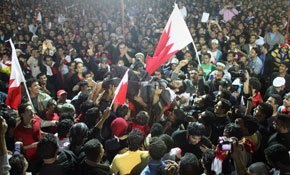To what extent then do the demonstrations since February put inter-communal peace at risk in Bahrain?
A YouGov-Cambridge poll conducted whilst protestors occupied the Pearl Roundabout in central Manama but before the entry of Saudi forces into the country provides some answers, but those answers are far from unambiguous. Those who see the protests as a portent of Sunni-Shi’a antagonism would point to how responses of the two religious denominations differ strongly to key questions about the country’s present situation. Most strikingly, 86% of Shi’a Bahrainis see the current protests as “the true voice of the people of Bahrain”, whilst only 9% of Sunni Bahrainis agree; instead, 62% of Sunnis see them as the “result of external interference from neighbouring countries”, adhering to the Bahraini government’s claim that Iranian meddling lies behind the demonstrations, a view which only 2% of Shi’a accept.
This difference brings back long-standing fears of the major power to Bahrain’s north – Iran formally abandoned its claim to sovereignty over Bahrain in 1971, but the issue still has strong resonances in both countries – which in turn raises inter-communal suspicions, especially when accusations of collaboration fly.
Sunni and Shi’a in Bahrain interpret the current protests in diverging ways, but do their actual ambitions differ greatly? Here the poll results are somewhat more favourable. When asked to select from a list what values respondents would like to see improve in Bahrain, the most popular response from both Sunni and Shi’a is that of “equal rights to all citizens”: 76% of Shi’a rate this as the highest or second highest priority, whilst 62% of Sunnis likewise rate it as their first or second choice. The underlying current is the significant and long-standing disparity between Sunni and Shi’a in access to the labour market, particularly in the state sector. Whilst over the past decades this has meant that many Shi’a families have become wealthy through acting as private entrepreneurs, a large majority of Bahrain’s poor are Shi’a. Their restricted political influence – there is an elected lower house of parliament, but its power is curtailed by a fully appointed upper house and executive – has also entailed limited redress against actions of Bahrain’s security forces. This feature has become most visible with the deaths of protestors in the on-going demonstrations, night-raids against homes, and deaths in police custody, all of which have principally affected Shi’a…
This difference brings back long-standing fears of the major power to Bahrain’s north – Iran formally abandoned its claim to sovereignty over Bahrain in 1971, but the issue still has strong resonances in both countries – which in turn raises inter-communal suspicions, especially when accusations of collaboration fly.
Sunni and Shi’a in
Through the significance attributed to equality in polling results, one can conclude that both Sunni and Shi’a recognise the scale of the socio-economic and political problems that arise out of long-standing inter-communal disparities. Both groups seem to recognise that overcoming these disparities will be a major task of any future government. What they remain divided on though is the means through which they should be addressed. When asked about who “has the qualities to take Bahrain forward”, only 6% of Bahraini Shia have confidence in the prime minister, Prince Khalifa bin Salman Al Khalifa, who has held that post since 1971, and is the uncle of the King Hamad. Prince Khalifa, having dominated
Perhaps the most illustrative difference over means comes from answers to a question about the future of the monarchy. When asked to choose between a “powerful monarch”, a “modern constitutional monarch” in which “the monarch is a figurehead, but has no political power”, and “no monarch at all”, almost three-quarters (73%) of Sunni Bahrainis opt for the powerful monarch whilst more than three-quarters (78%) of Shi’a Bahrainis opt for a figurehead monarch. Only a relatively small proportion – 4% of Sunnis, 13% of Shi’a – wants to do away with the monarchy as a whole. Sunni Bahrainis still have faith that the political system that has largely served them well can continue to address the country’s problems, whereas most Shi’a think significant structural changes are needed for this to be achieved. Nevertheless, even for the Shi’a, few are seeking the overthrow of the monarchical system, indicating that careful management by the rulers remains a viable strategy for preserving the kingdom.
One of the central questions that will be engaged in any attempt by the current rulers to move the country out of crisis is the future role of Shi’a-led political parties in the government of










